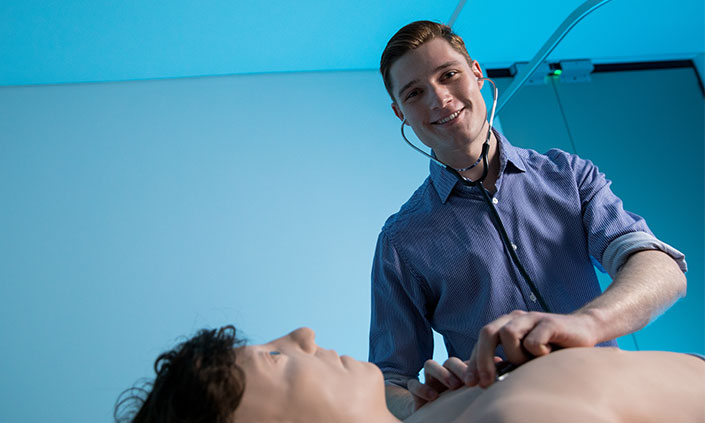Prepared for primary care
Dr Gareth Mason, returning as a GP academic registrar, says the Macquarie MD was great preparation for a career in general practice.

When Gareth Mason graduated from the Doctor of Medicine (MD) program at Macquarie University in 2021, he found himself already drawn towards a career in primary care rather than a hospital-based medical or surgical specialty.
After two post-graduation years of rotations as a resident medical officer across several Sydney hospitals, Dr Mason was confident his future lay in general practice, and he joined the Royal Australian College of General Practitioners (RACGP) training program.
Now he’s excited to be on his way back to Macquarie in 2026 as an academic GP registrar, having been selected for one of just twenty places available nationally each year under a special RACGP initiative.
“The four-year Macquarie MD course is strongly oriented to general practice, so it was always a positive career option that I considered,” says Dr Mason.
“Now I particularly want to explore what’s possible in primary care in terms of relevant research and I enjoy teaching, so the academic registrar post gives me an ideal chance to do both.”
The RACGP’s academic registrar program allows trainee GPs to expand their research, medical education and critical thinking skills during a part-time academic post that they complete while they continue their clinical training in primary care.
GP registrars are expected to develop a research project in an area of general practice and to teach medical students while they themselves are supervised, mentored and supported by medical educators.
“In the research I’ve proposed, I’ll be looking at the uptake of technology in primary care and particularly the use of artificial intelligence (AI) in GP record-keeping and documentation,” Dr Mason says.
“In the future, I also hope to look at new models of care and, in particular, how we can improve the delivery and continuity of care for people who are seeing GPs.”
Dr Mason’s experience working in general practice over the past two years has exposed him to a range of primary care needs and social environments, from the well-to-do suburbs of Sydney’s northern beaches to demographically diverse St Marys in Sydney’s west, and he’s enthusiastic about the way the Macquarie MD prepared him.
“Clinical tutorials in Year 1 are taught by academic GPs, and the majority of the teaching and learning cases we worked through were set against a background of primary care,” he says.
“That case experience gave me a very accurate and realistic understanding of the kind of patients I actually see now in general practice.”
“We covered mental health and counselling, respiratory infections, women’s health, chronic diseases, preventive medicine, and even basic musculoskeletal injuries and fractures, which lines up very well with the mix of cases I now see in general practice.”
Through Years 2 and 3 of the four-year MD program, students at Macquarie are able to experience the importance and impact of continuity in primary care by having a long-term placement with a single general practice.
“It allowed us to see patients on several occasions, following their clinical course over time and giving us the opportunity to get regular feedback on our diagnostic workups, investigation results and treatment choices,” says Dr Mason.
The GP teaching staff were themselves strong role models, he says.
“The quality of their teaching was excellent and having a smaller cohort of students than some other medical schools meant we got to know the educators – and they got to know us – very well.”
“They left me with a strong and clear conviction that general practice is a fulfilling and rewarding career choice – and they were living proof of it.”
As an academic GP registrar, Dr Mason will be able to ‘return the favour’ by teaching on Macquarie’s MD program and providing mentorship to students as they progress through their own general practice placements.
“We believe it’s important for graduates who go into general practice to have the option of a ‘portfolio’ career with opportunities for teaching and research as well as clinical work,” says Associate Professor Janani Mahadeva, who is Stage 1 lead for Years 1 and 2 of the Macquarie MD program.
“Clinical practice in primary care is increasingly demanding and it’s vital for the future of our GP workforce that we find ways of avoiding burnout.”
“We’re really pleased to support the academic GP registrar program and particularly excited to welcome Gareth back to Macquarie in 2026,” says Associate Professor Mahadeva, who is a GP herself and was Gareth’s Year 1 tutor.
“He was an exceptional student – winner of the University Medal in his graduating year – and was highly engaged in student ambassador work.”
“It’s exciting and satisfying that we can offer our MD graduates the chance to come back and work in our own general practice based right here on campus.”